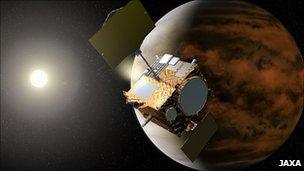Japan's Akatsuki probe fails to enter Venus orbit
- Published

An artist's impression of the Akatsuki probe at the planet Venus
Japan's first space probe bound for Venus has failed to enter the planet's orbit, the country's space agency says.
The space craft, Akatsuki, is believed to have passed Venus after it failed to slow down sufficiently.
Akatsuki, launched about 200 days ago, fired its main engine just before 0000 GMT on Monday to allow the planet's gravity to capture the probe.
A previous interplanetary space probe launched by Japan in 1998 to orbit Mars was also a failure.
Akatsuki briefly lost contact but was now back in communication and functioning normally as it headed off around the sun, officials said.
"Unfortunately, it did not attain an orbit," said Hitoshi Soeno of the space agency, Jaxa.
"But it appears to be functioning and we may be able to try again when it passes by Venus six years from now."
The failure was disappointing for the 200,000 names carried by the craft in a bid to raise awareness of Japan's space programme.
Akatsuki was launched to the inner-world by an H-IIA rocket in May. Its goals included finding definitive evidence for lightning and for active volcanoes.
The Japanese probe had been due to conduct joint observations with the European Space Agency's Venus Express craft, which arrived at the planet in 2006.
Venus is almost identical in size to earth, and is thought to have a similar composition.
The thick Venusian atmosphere is opaque to instruments that operate at visible wavelengths.
Europe's Venus Express probe recently found lava flows that could have been younger than 250,000 years old.
Japan scored a major success earlier this year with the safe return to Earth of the Hayabusa probe which had collected dust grains from the surface of an asteroid.
The same H-IIA rocket that launched Akatsuki also launched the country's Ikaros solar sail - the first practical demonstration of a spacecraft being propelled around the Solar System by the pressure of sunlight alone.
- Published16 June 2010
- Published21 May 2010